Advanced Accounting Report: APRA Probe Risks CBA Rating Analysis
VerifiedAdded on 2019/11/26
|5
|980
|225
Report
AI Summary
This report provides an in-depth analysis of the accounting issues arising from the APRA probe into the Commonwealth Bank (CBA), as discussed in 'The Australian Financial Review.' It identifies key accounting concerns such as inadequate financial planning, money laundering, and the need for robust accountability frameworks. The report supports the article's views on the necessity of periodic investigations into corporate governance and risk management within the banking sector, while also critiquing the potential negative impacts of public reviews. Furthermore, the analysis connects the APRA probe to advanced accounting theories, specifically the private interest theory, decision-usefulness theory, and positive accounting theory. The report concludes by emphasizing the importance of cultural changes within banking institutions to regain public trust and confidence, offering a comprehensive understanding of the financial and regulatory landscape.
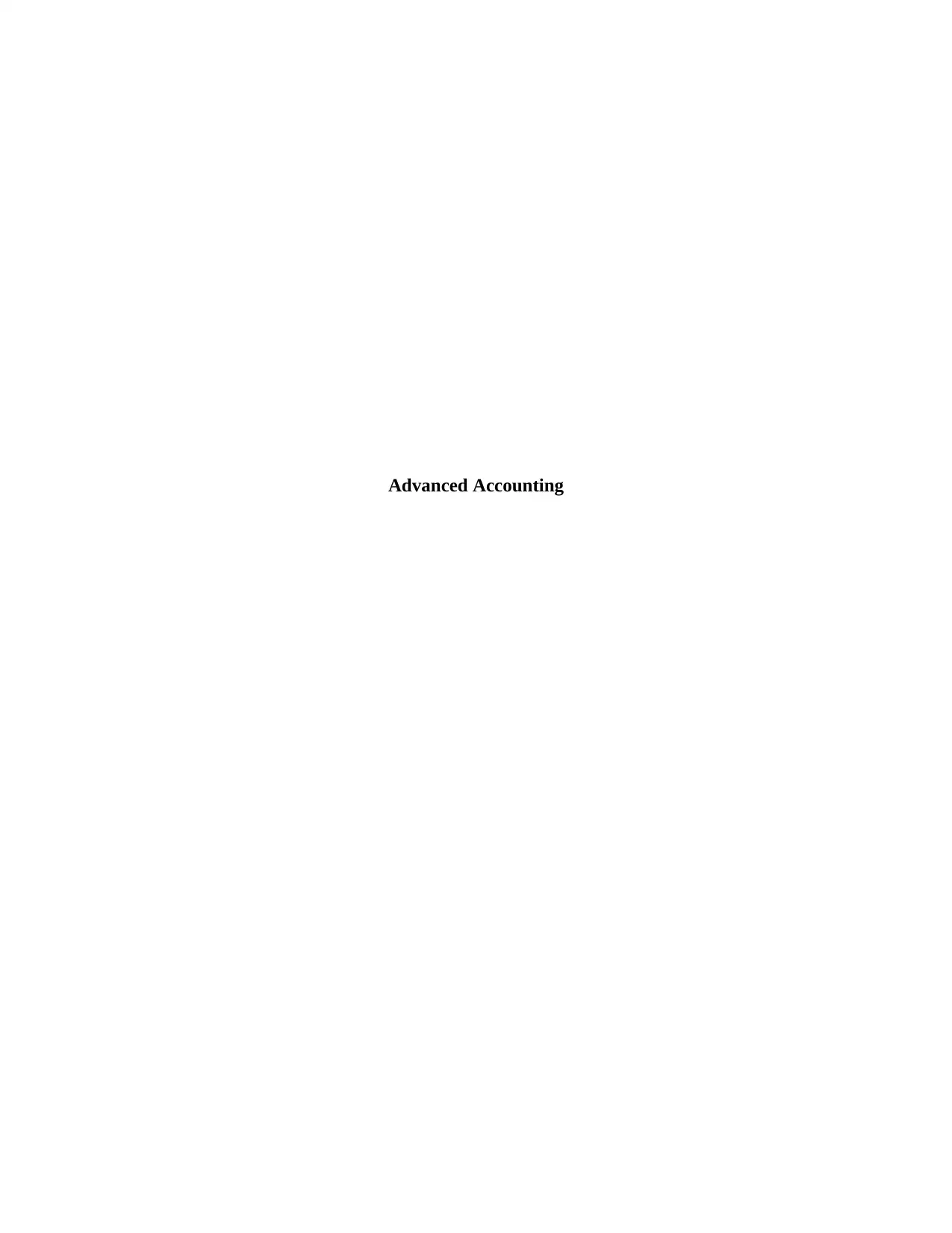
Advanced Accounting
Paraphrase This Document
Need a fresh take? Get an instant paraphrase of this document with our AI Paraphraser
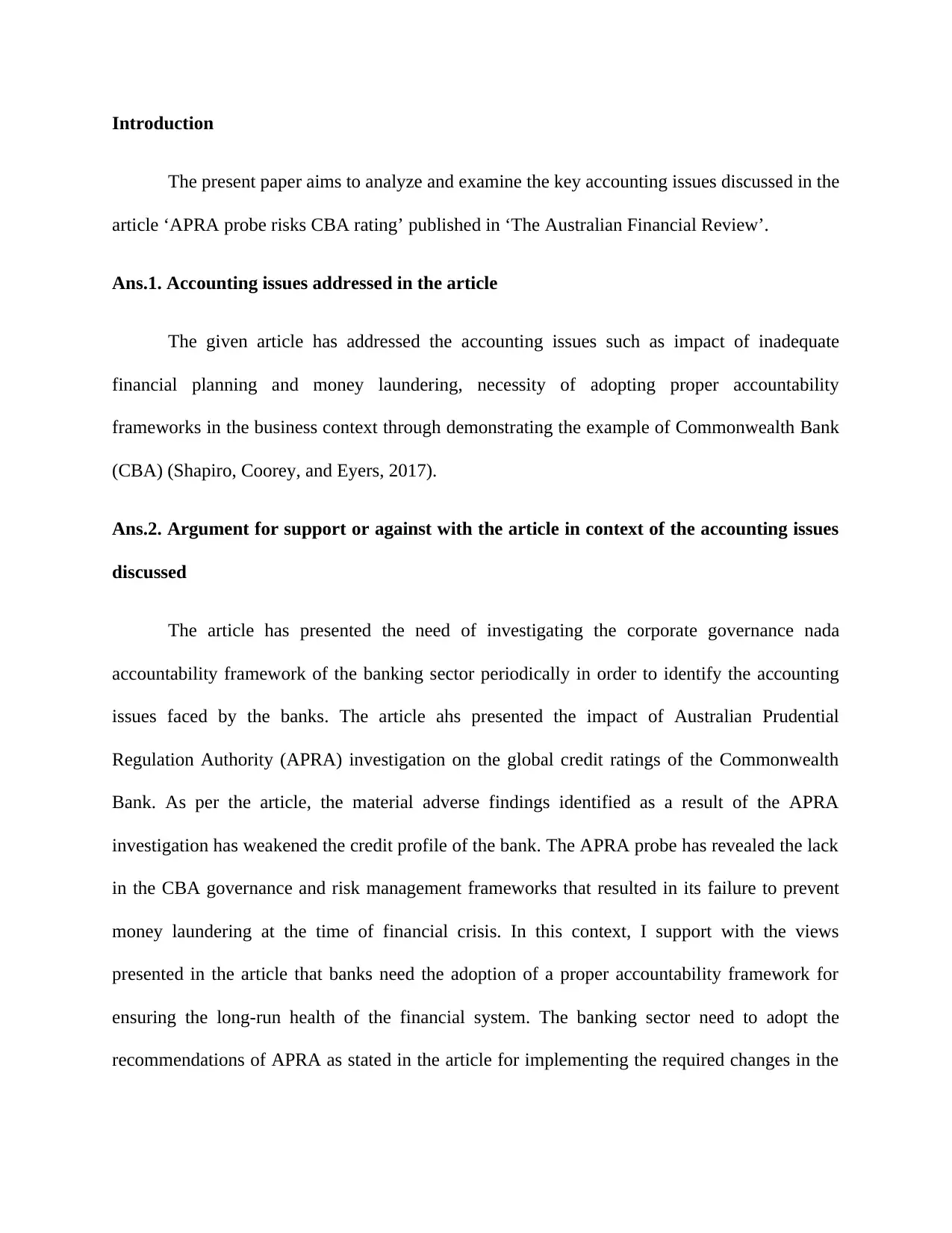
Introduction
The present paper aims to analyze and examine the key accounting issues discussed in the
article ‘APRA probe risks CBA rating’ published in ‘The Australian Financial Review’.
Ans.1. Accounting issues addressed in the article
The given article has addressed the accounting issues such as impact of inadequate
financial planning and money laundering, necessity of adopting proper accountability
frameworks in the business context through demonstrating the example of Commonwealth Bank
(CBA) (Shapiro, Coorey, and Eyers, 2017).
Ans.2. Argument for support or against with the article in context of the accounting issues
discussed
The article has presented the need of investigating the corporate governance nada
accountability framework of the banking sector periodically in order to identify the accounting
issues faced by the banks. The article ahs presented the impact of Australian Prudential
Regulation Authority (APRA) investigation on the global credit ratings of the Commonwealth
Bank. As per the article, the material adverse findings identified as a result of the APRA
investigation has weakened the credit profile of the bank. The APRA probe has revealed the lack
in the CBA governance and risk management frameworks that resulted in its failure to prevent
money laundering at the time of financial crisis. In this context, I support with the views
presented in the article that banks need the adoption of a proper accountability framework for
ensuring the long-run health of the financial system. The banking sector need to adopt the
recommendations of APRA as stated in the article for implementing the required changes in the
The present paper aims to analyze and examine the key accounting issues discussed in the
article ‘APRA probe risks CBA rating’ published in ‘The Australian Financial Review’.
Ans.1. Accounting issues addressed in the article
The given article has addressed the accounting issues such as impact of inadequate
financial planning and money laundering, necessity of adopting proper accountability
frameworks in the business context through demonstrating the example of Commonwealth Bank
(CBA) (Shapiro, Coorey, and Eyers, 2017).
Ans.2. Argument for support or against with the article in context of the accounting issues
discussed
The article has presented the need of investigating the corporate governance nada
accountability framework of the banking sector periodically in order to identify the accounting
issues faced by the banks. The article ahs presented the impact of Australian Prudential
Regulation Authority (APRA) investigation on the global credit ratings of the Commonwealth
Bank. As per the article, the material adverse findings identified as a result of the APRA
investigation has weakened the credit profile of the bank. The APRA probe has revealed the lack
in the CBA governance and risk management frameworks that resulted in its failure to prevent
money laundering at the time of financial crisis. In this context, I support with the views
presented in the article that banks need the adoption of a proper accountability framework for
ensuring the long-run health of the financial system. The banking sector need to adopt the
recommendations of APRA as stated in the article for implementing the required changes in the
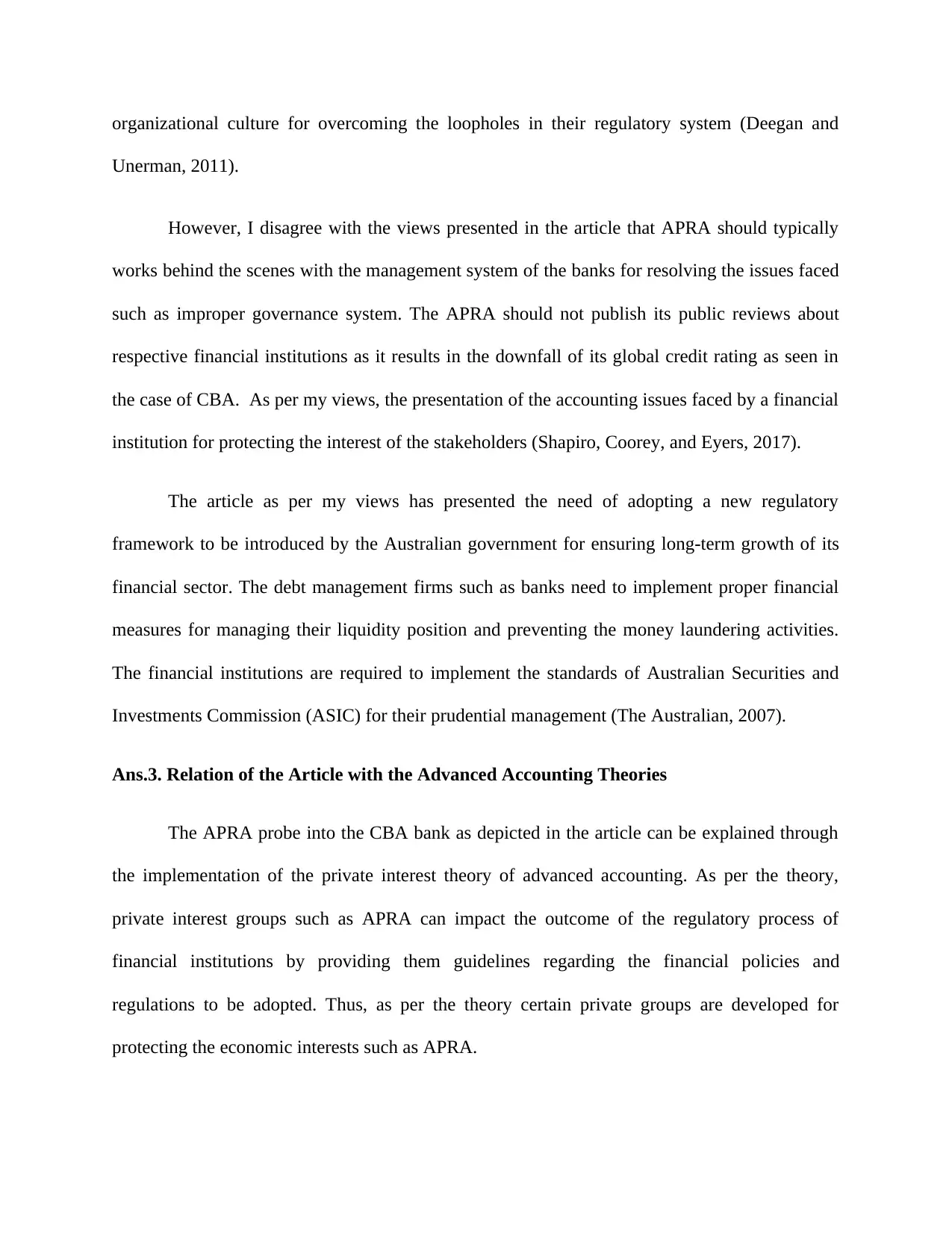
organizational culture for overcoming the loopholes in their regulatory system (Deegan and
Unerman, 2011).
However, I disagree with the views presented in the article that APRA should typically
works behind the scenes with the management system of the banks for resolving the issues faced
such as improper governance system. The APRA should not publish its public reviews about
respective financial institutions as it results in the downfall of its global credit rating as seen in
the case of CBA. As per my views, the presentation of the accounting issues faced by a financial
institution for protecting the interest of the stakeholders (Shapiro, Coorey, and Eyers, 2017).
The article as per my views has presented the need of adopting a new regulatory
framework to be introduced by the Australian government for ensuring long-term growth of its
financial sector. The debt management firms such as banks need to implement proper financial
measures for managing their liquidity position and preventing the money laundering activities.
The financial institutions are required to implement the standards of Australian Securities and
Investments Commission (ASIC) for their prudential management (The Australian, 2007).
Ans.3. Relation of the Article with the Advanced Accounting Theories
The APRA probe into the CBA bank as depicted in the article can be explained through
the implementation of the private interest theory of advanced accounting. As per the theory,
private interest groups such as APRA can impact the outcome of the regulatory process of
financial institutions by providing them guidelines regarding the financial policies and
regulations to be adopted. Thus, as per the theory certain private groups are developed for
protecting the economic interests such as APRA.
Unerman, 2011).
However, I disagree with the views presented in the article that APRA should typically
works behind the scenes with the management system of the banks for resolving the issues faced
such as improper governance system. The APRA should not publish its public reviews about
respective financial institutions as it results in the downfall of its global credit rating as seen in
the case of CBA. As per my views, the presentation of the accounting issues faced by a financial
institution for protecting the interest of the stakeholders (Shapiro, Coorey, and Eyers, 2017).
The article as per my views has presented the need of adopting a new regulatory
framework to be introduced by the Australian government for ensuring long-term growth of its
financial sector. The debt management firms such as banks need to implement proper financial
measures for managing their liquidity position and preventing the money laundering activities.
The financial institutions are required to implement the standards of Australian Securities and
Investments Commission (ASIC) for their prudential management (The Australian, 2007).
Ans.3. Relation of the Article with the Advanced Accounting Theories
The APRA probe into the CBA bank as depicted in the article can be explained through
the implementation of the private interest theory of advanced accounting. As per the theory,
private interest groups such as APRA can impact the outcome of the regulatory process of
financial institutions by providing them guidelines regarding the financial policies and
regulations to be adopted. Thus, as per the theory certain private groups are developed for
protecting the economic interests such as APRA.
⊘ This is a preview!⊘
Do you want full access?
Subscribe today to unlock all pages.

Trusted by 1+ million students worldwide
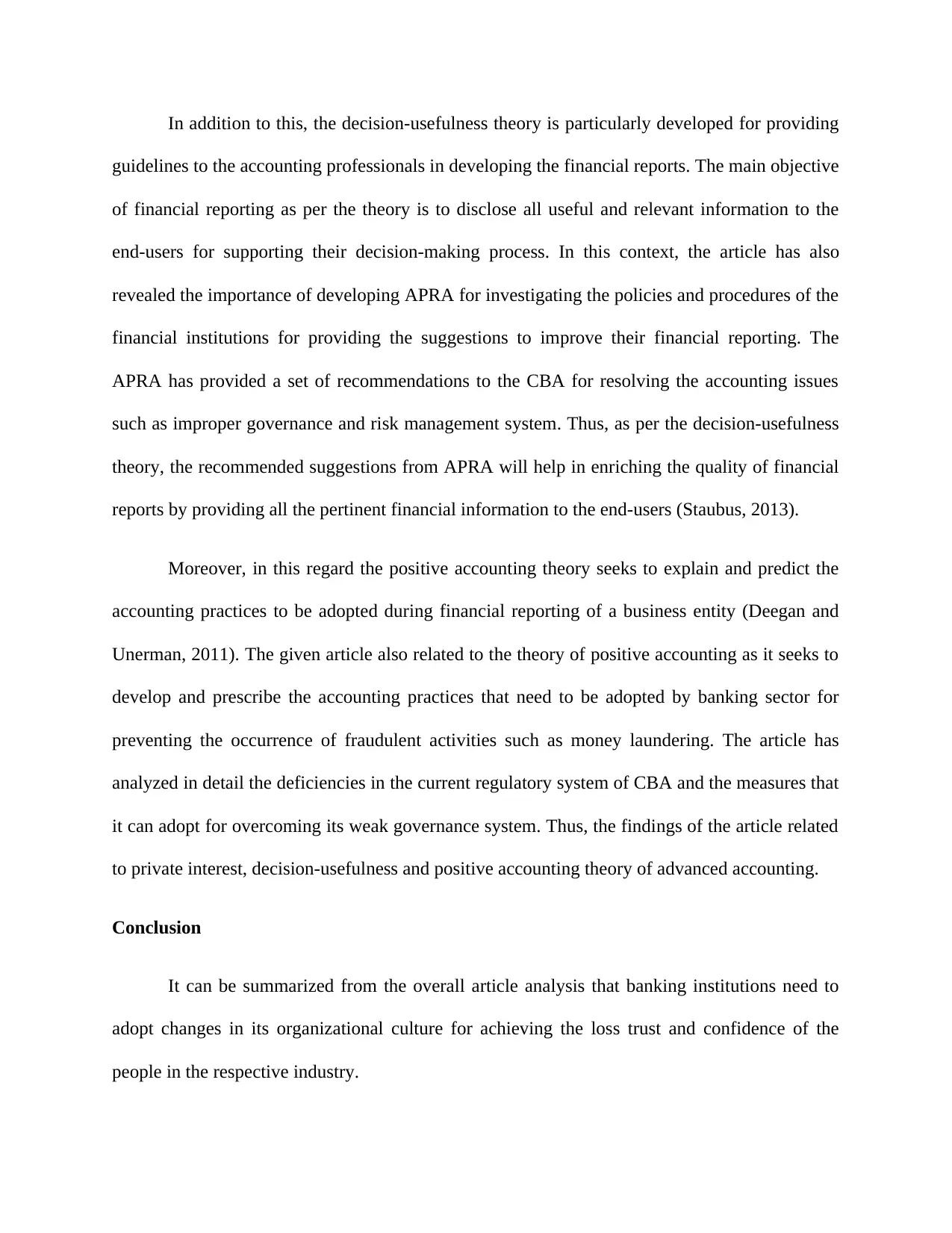
In addition to this, the decision-usefulness theory is particularly developed for providing
guidelines to the accounting professionals in developing the financial reports. The main objective
of financial reporting as per the theory is to disclose all useful and relevant information to the
end-users for supporting their decision-making process. In this context, the article has also
revealed the importance of developing APRA for investigating the policies and procedures of the
financial institutions for providing the suggestions to improve their financial reporting. The
APRA has provided a set of recommendations to the CBA for resolving the accounting issues
such as improper governance and risk management system. Thus, as per the decision-usefulness
theory, the recommended suggestions from APRA will help in enriching the quality of financial
reports by providing all the pertinent financial information to the end-users (Staubus, 2013).
Moreover, in this regard the positive accounting theory seeks to explain and predict the
accounting practices to be adopted during financial reporting of a business entity (Deegan and
Unerman, 2011). The given article also related to the theory of positive accounting as it seeks to
develop and prescribe the accounting practices that need to be adopted by banking sector for
preventing the occurrence of fraudulent activities such as money laundering. The article has
analyzed in detail the deficiencies in the current regulatory system of CBA and the measures that
it can adopt for overcoming its weak governance system. Thus, the findings of the article related
to private interest, decision-usefulness and positive accounting theory of advanced accounting.
Conclusion
It can be summarized from the overall article analysis that banking institutions need to
adopt changes in its organizational culture for achieving the loss trust and confidence of the
people in the respective industry.
guidelines to the accounting professionals in developing the financial reports. The main objective
of financial reporting as per the theory is to disclose all useful and relevant information to the
end-users for supporting their decision-making process. In this context, the article has also
revealed the importance of developing APRA for investigating the policies and procedures of the
financial institutions for providing the suggestions to improve their financial reporting. The
APRA has provided a set of recommendations to the CBA for resolving the accounting issues
such as improper governance and risk management system. Thus, as per the decision-usefulness
theory, the recommended suggestions from APRA will help in enriching the quality of financial
reports by providing all the pertinent financial information to the end-users (Staubus, 2013).
Moreover, in this regard the positive accounting theory seeks to explain and predict the
accounting practices to be adopted during financial reporting of a business entity (Deegan and
Unerman, 2011). The given article also related to the theory of positive accounting as it seeks to
develop and prescribe the accounting practices that need to be adopted by banking sector for
preventing the occurrence of fraudulent activities such as money laundering. The article has
analyzed in detail the deficiencies in the current regulatory system of CBA and the measures that
it can adopt for overcoming its weak governance system. Thus, the findings of the article related
to private interest, decision-usefulness and positive accounting theory of advanced accounting.
Conclusion
It can be summarized from the overall article analysis that banking institutions need to
adopt changes in its organizational culture for achieving the loss trust and confidence of the
people in the respective industry.
Paraphrase This Document
Need a fresh take? Get an instant paraphrase of this document with our AI Paraphraser
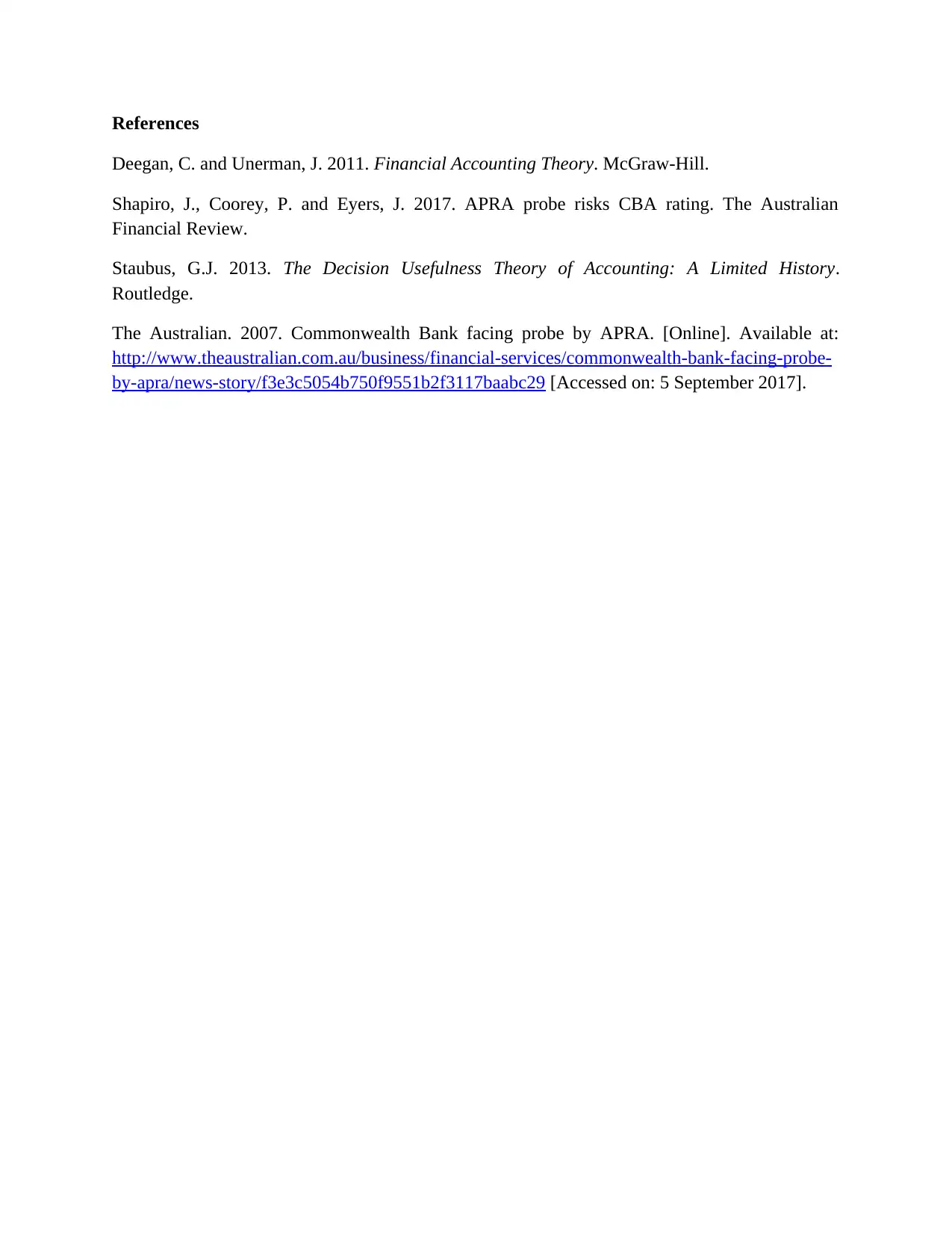
References
Deegan, C. and Unerman, J. 2011. Financial Accounting Theory. McGraw-Hill.
Shapiro, J., Coorey, P. and Eyers, J. 2017. APRA probe risks CBA rating. The Australian
Financial Review.
Staubus, G.J. 2013. The Decision Usefulness Theory of Accounting: A Limited History.
Routledge.
The Australian. 2007. Commonwealth Bank facing probe by APRA. [Online]. Available at:
http://www.theaustralian.com.au/business/financial-services/commonwealth-bank-facing-probe-
by-apra/news-story/f3e3c5054b750f9551b2f3117baabc29 [Accessed on: 5 September 2017].
Deegan, C. and Unerman, J. 2011. Financial Accounting Theory. McGraw-Hill.
Shapiro, J., Coorey, P. and Eyers, J. 2017. APRA probe risks CBA rating. The Australian
Financial Review.
Staubus, G.J. 2013. The Decision Usefulness Theory of Accounting: A Limited History.
Routledge.
The Australian. 2007. Commonwealth Bank facing probe by APRA. [Online]. Available at:
http://www.theaustralian.com.au/business/financial-services/commonwealth-bank-facing-probe-
by-apra/news-story/f3e3c5054b750f9551b2f3117baabc29 [Accessed on: 5 September 2017].
1 out of 5
Related Documents
Your All-in-One AI-Powered Toolkit for Academic Success.
+13062052269
info@desklib.com
Available 24*7 on WhatsApp / Email
![[object Object]](/_next/static/media/star-bottom.7253800d.svg)
Unlock your academic potential
Copyright © 2020–2026 A2Z Services. All Rights Reserved. Developed and managed by ZUCOL.





